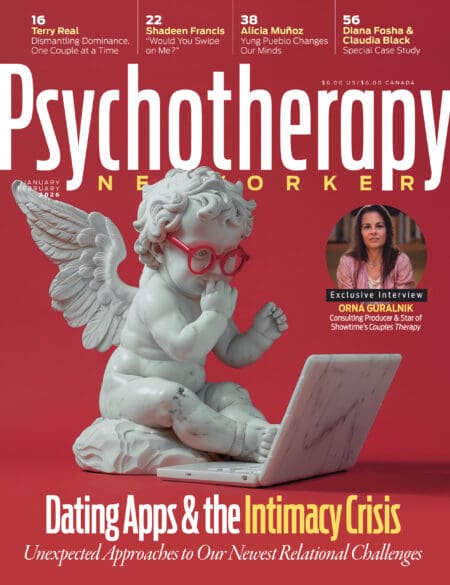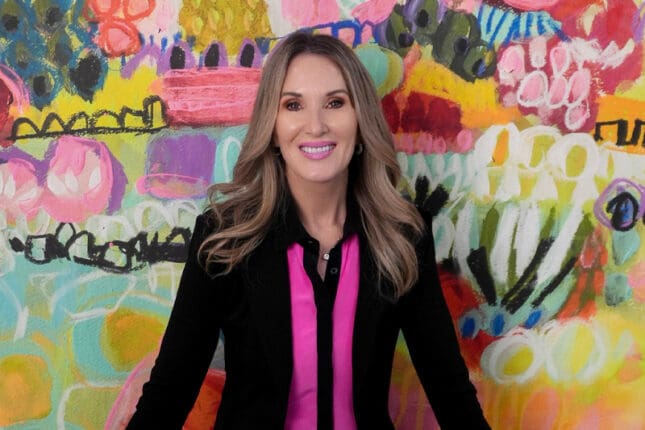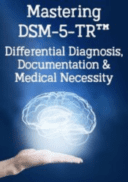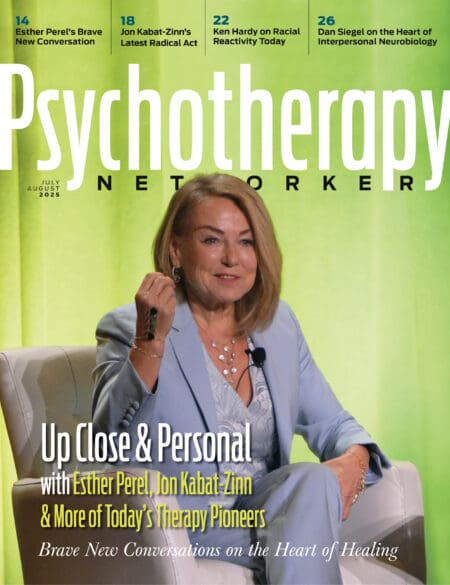Enjoy the audio preview version of this article—perfect for listening on the go.
We’re therapists in 2025, so we know a lot about the human brain, right? Well, according to Caroline Leaf—clinical and research neuroscientist, author, and host of the popular podcast The Dr. Leaf Show, which has over fifty million downloads worldwide—we’re missing some critical information that could directly affect our work with clients and how we try to help them create lasting change in their lives.
Having spent 40 years studying the mind-brain-body connection, habits, neuroplasticity, and the best methods for enhancing treatment approaches in healthcare, she believes therapists and other helping professionals must understand the distinction between the mind and the brain—often considered synonyms. After all, when we mistake the brain for the mind, our treatment moves unnecessarily slowly—or worse, gets derailed.
Leaf’s popular books Switch on Your Brain and Cleaning Up Your Mental Mess deliver her complex neuroscience messages to the masses in accessible language that supports people in creating healthy habits in only 63 days. No, it was never 21. Her latest book, Help in a Hurry, empowers people to harness mind management in moments of stress, turning breakdowns into breakthroughs and paving the way for lasting transformation.
In a recent meeting of minds, not brains, Leaf helped me grasp the mind-brain-body connection and how I could introduce “mind-management” into my practice.
Ryan Howes: You’ve written books about parenting, stress management, nutrition, brain injury, and mindfulness research. Is there a through line in your work?
Caroline Leaf: I’m a communication pathologist and clinical research neuroscientist focused on psychoneurobiology—the connections between human experiences and behaviors. I completed interdisciplinary training 40 years ago combining medicine, psychology, communication, and pathology, giving me a broad understanding of the mind-brain-body relationship.
My core philosophy: the brain and body don’t drive the show—the mind does. The brain and body host the mind. In the late 1980s, I conducted pioneering neuroplasticity research showing that when you manage your mind, you change your brain and body. This applies across conditions from head injuries and neurological issues to Parkinson’s, Alzheimer’s, learning disabilities, and emotional trauma.
I teach mind management—a comprehensive approach that touches every area of human life, since without our minds we cannot do anything. It involves consciously guiding your thoughts to produce beneficial biochemical reactions in the brain, reduce stress, and support overall health and resilience, which I discuss in detail in my books Cleaning Up Your Mental Mess and Help in a Hurry.
RH: I’d love to hear your theory of mind.
Leaf: Essentially, mind is a simple word for consciousness, soul, and spirit. Mind has three levels: the conscious mind we’re all aware of; the subconscious mind, where we store reactions and habits; and the nonconscious mind—something few truly understand. The nonconscious mind is your 24/7 driving force: your reasoning, wisdom, intuition, and insight. It’s your constant companion that absorbs everything. Collectively, these three parts of the mind are 99 percent of who you are. Brain and body are about one percent.
Every problem we’ve experienced or created, and every solution, exists in our mind, along with every life experience from the womb to now—all stored as thoughts made up of memories. Your nonconscious holds it all. It’s infinite in space, operates at beyond 400 billion actions per second, and drives not only your psychology but your neurophysiology. Your mind makes your heart beat, your lungs breathe, your genes work.
RH: So how does the mind change the brain?
Leaf: Neuroplasticity is often described as the brain changing itself, but it actually takes the mind to change the brain.
Researchers have located basic memory and emotion in specific brain areas, but they’ve never found regions that generate reasoning, abstract thought, or meaning. That’s the mind’s domain. The brain is a responder, not a generator. Neurosurgeon Walter Penfield’s research demonstrated that the brain responds rather than generates—everything is processed through the mind first, then stored in both brain and body.
The mind creates meaning and processes experiences rapidly, sending this information to the brain as energy. This energy triggers electromagnetic, neurochemical, and genetic responses, wiring experiences into our neural and bodily systems. Memory isn’t just stored in the brain—it’s throughout the body, as somatic and PTSD therapies recognize.
Despite this, biomedical research still focuses primarily on the brain, treating depression as faulty neurons or genes while spending billions trying to locate abstract thought in brain regions. This resembles modern phrenology.
The reality is more complex: we function through a mind-brain-body network in constant flux. Therapists intuitively work with this when they examine how clients show up, trace these patterns, and help redesign better functioning.
Building new habits takes real time—research shows lasting habit formation requires 59-254 days, not just quick fixes.
RH: I’ve always heard that it takes 21 days. I’m guessing your work proves that wrong?
Leaf: The popular “21 days to change” idea largely came from surgeon Maxwell Maltz, who noticed his patients adjusted to surgery results in about 21 days. He applied this to all behavior change, but research shows real transformation takes at least three 21-day cycles.
In the first 21 days, you build awareness, deconstruct root causes, and start reconstruction. By day 21–28, you may feel progress, but stopping here is a “danger zone”—the change isn’t stable yet. Continuing for two more cycles (42 days) helps solidify new patterns, especially in therapy.
In my opinion, therapists should focus on one issue per 9–12-week cycle rather than juggling multiple problems. The mind-brain-body is organized; without structure, neuroplasticity becomes chaotic. Mind-management teaches self-regulation to drive intentional brain rewiring and lasting change.
RH: As therapists, we’re trained to follow the client’s lead, so we can cover 10 different topics in a single session. You’re saying it’s better to focus on one topic for multiple sessions—maybe for nine weeks—to solidify growth and change?
Leaf: Yes. Real change takes time—at least three 21-day cycles. In the first cycle, clients build awareness and start deconstructing root causes. By around day 21–28, they often feel progress and want to move on, but this is a danger zone because the new pattern isn’t stable yet. Continuing for two more cycles (another 42 days) helps solidify change.
This means it’s more effective to focus on one issue for 9–12 weeks rather than covering multiple topics in one session. Organizing therapy this way aligns with how the mind-brain-body rewires itself, creating lasting growth instead of cycling through unresolved issues.
RH: That’s quite a shift. What’s one thing you hope therapists will take from your work?
Leaf: Understanding the difference between the mind and the brain is transformative. It shows that you’re not limited by your biology—you can actively direct change. When you grasp what the mind truly is, you unlock the ability to harness it, integrate mind management into your practice, and help clients rewire their lives with purpose and hope.
Caroline Leaf
Caroline Leaf, PhD, is a clinical and research neuroscientist, communication pathologist and audiologist, and leading expert in the science of mind-management, neuroplasticity, and emotional resilience. Dr. Leaf conducted pioneering research in neuroplasticity as early as the 1990s, focusing on traumatic brain injury, learning disabilities, cognitive decline related to neurological disorders, and trauma. Her podcast The Dr. Leaf Show has won the silver signal award for best science podcast, and she’s the author of several bestselling books, including Cleaning Up Your Mental Mess, Think, Learn, Succeed, and Switch on Your Brain.
Ryan Howes
Ryan Howes, Ph.D., ABPP is a Pasadena, California-based psychologist, musician, and author of the “Mental Health Journal for Men.” Learn more at ryanhowes.net.














